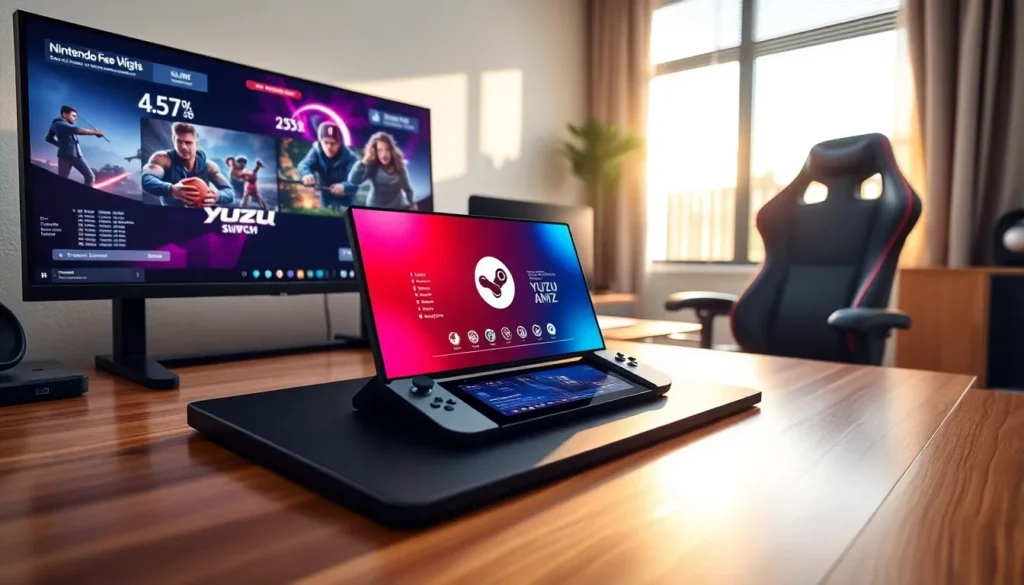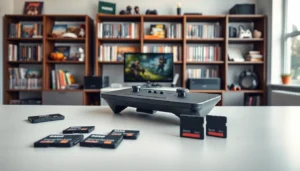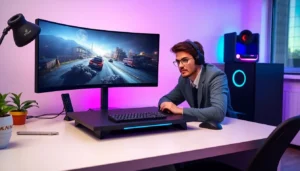Table of Contents
ToggleIf you’ve been daydreaming about playing your favorite Nintendo Switch games on a handheld like the Steam Deck, you’re not alone. The Yuzu emulator makes this possible, and it’s quite the tech marvel. Imagine diving into a gaming world where you can take your gaming anywhere – that’s what Yuzu promises. But wait, before you grab your Deck and start downloading, let’s make sure you’re set for success: after all, we don’t want you ending up in the ‘What did I just do?’ zone, right? Let’s embark on this quirky journey together and unveil the magic of Yuzu on the Steam Deck.
What Is Yuzu and How It Works with Steam Deck

Yuzu is an open-source Nintendo Switch emulator that allows gamers to play Switch titles on other platforms. Operating primarily on Windows, Linux, and macOS, Yuzu acts like a bridge, letting enthusiasts experience their favorite games wherever they want. Picture the freedom.
When working with the Steam Deck, Yuzu leverages the Deck’s powerful hardware and Linux operating system to deliver stunning graphics and gameplay. Even though the Switch may be portable, Yuzu takes it a step further. With its ability to handle higher resolutions and faster load times, Yuzu forges a new frontier for gaming. In essence, it transforms the Steam Deck into a mini-Switch, ready to tackle an array of titles. Imagine playing “The Legend of Zelda: Breath of the Wild” or “Super Smash Bros. Ultimate”, but with improved performance, sounds tempting, doesn’t it?
With Yuzu, the Steam Deck becomes a powerhouse, breathing new life into beloved games while maximizing the device’s capabilities.
Setting Up Yuzu on Your Steam Deck
Getting Yuzu up and running on your Steam Deck isn’t as daunting as it sounds. While it may require a few steps, the payoff is well worth it. First off, make sure your device is fully updated. A smooth start ensures fewer headaches later on.
Next, you’ll want to switch your Steam Deck to Desktop Mode. To do this, press the Steam button, navigate to the Power options, and select Desktop Mode. Once you’re there, head over to Yuzu’s official website to download the latest version of the emulator for Linux. The download is straightforward, typically in a .AppImage format.
After downloading, you might need to change the properties of the file. Right-click the .AppImage file, select Properties, and ensure it’s marked as executable. This allows you to run the emulator without any hiccups.
Now, launching Yuzu is merely a matter of double-clicking the .AppImage file. Congrats, you’re now part of the elite group of gamers playing Nintendo Switch titles on a Steam Deck. Don’t forget to tweak a few settings in Yuzu to configure your controls, graphics, and performance to create the best possible experience. Get ready to jump into gaming bliss.
Game Compatibility: Which Titles Work Best?
Here’s the part every gamer is curious about: which titles can you actually play with Yuzu on your Steam Deck? Well, the good news is that Yuzu has come a long way in terms of compatibility, and many fan-favorites run surprisingly well.
Titles like “Pokemon Sword and Shield”, “Xenoblade Chronicles 2”, and even “Animal Crossing: New Horizons” are known to perform impressively. But, it’s important to note that not every game runs flawlessly, some may experience slight glitches or frame drops.
It’s always a smart move to check Yuzu’s official compatibility list before diving into a new title. The community has diligently tested many games, providing insights on performance levels. This way, you won’t end up scratching your head thinking, ‘Why did I pick that title?’ Instead, you’ll be fully armed with knowledge, ready to enjoy an epic adventure.
Performance Optimization Tips for Yuzu on Steam Deck
Now that you’ve got Yuzu up and running on your Steam Deck, let’s enhance that experience. There are several steps you can take to optimize performance. First and foremost, ensure you close unnecessary applications running in the background. The Steam Deck is powerful, but every bit of performance helps.
Adjusting graphical settings within Yuzu can also make a significant difference. Lowering the resolution can alleviate some strain, especially for heavier games. Also, consider enabling the asynchronous GPU emulation, which allows for smoother performance.
Overclocking is another avenue worth exploring. Many gamers have reported success with it, but it comes with risks. If you’re comfortable ensuring your device stays cool, overclocking could boost performance significantly. Just remember: balance is key. This isn’t a race, it’s about finding what works best for your individual gaming experience.
Troubleshooting Common Issues
Even the best setups can hit a few bumps in the road. Some common issues experienced with Yuzu on the Steam Deck include crashing, lag, or audio sync problems. Luckily, most of these problems have straightforward solutions.
If Yuzu crashes frequently, check for pending updates. Developers are always patching issues and enhancing compatibility, so staying updated is crucial.
Laggy gameplay can often be mitigated by adjusting graphic settings. Try switching to a different resolution or tweaking texture settings. For audio sync problems, verifying audio settings both in Yuzu and the Steam Deck can resolve the issue.
Should all else fail, engaging with the Yuzu community can be invaluable. Forums and Discord servers are brimming with resources and tips from experienced users who’ve encountered similar hiccups. Remember, you’re not in this alone.
Future of Yuzu on the Steam Deck
Looking ahead, the future of Yuzu on the Steam Deck seems promising. With ongoing development, the emulator is set to receive regular updates, enhancing compatibility and performance. As more titles continue to be tested and optimized, gamers can expect an expanding library of playable games.
Also, as technology evolves, newer features may be introduced, making seamless gaming experiences more achievable. Emulators have paved the way for gaming’s versatility, allowing players to relive nostalgia or discover titles they may have missed. The collaboration between Yuzu and the Steam Deck isn’t just a fleeting trend: it’s a shift toward broader access to gaming across platforms. Innovation is brewing, and it’s exciting to think about what’s next.







